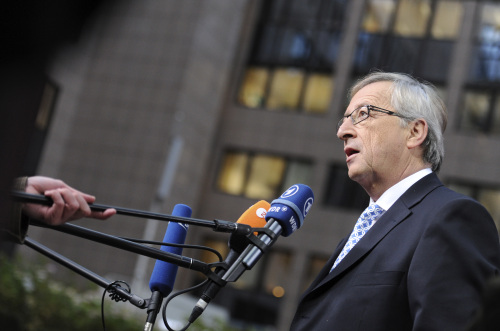EU finance ministers will hold a meeting to discuss $261 billion funding through the IMF
European finance ministers Monday (local time) will seek to meet a self-imposed deadline for drawing additional aid to the debt crisis and to form new budget rules as investor confidence that a comprehensive solution is achievable wanes.
Euro-area finance ministers will hold a conference call. Brussels time to discuss 200 billion euros ($261 billion) in additional funding through the International Monetary Fund and the mechanics of a so-called fiscal compact that was negotiated at a Dec. 9 European Union summit, according to two people familiar with the planning.
“They’ll try to get as much done as they can before Christmas, but it’s doubtful they’ll put markets in a Christmas mood,” Carsten Brzeski, an economist at ING Group in Brussels, said in an interview. “There is still so much uncertainty.”
The accord to ratchet up budget rules failed to ease concern that the monetary union risks buckling under the weight of the two-year-old crisis. Fitch Ratings lowered France’s credit outlook and put other euro-area nations on review Dec. 16, saying an overall crisis solution may be “technically and politically beyond reach.” Belgium’s rating was cut two levels to "Aa3" by Moody’s Investors Service on the same day.
 |
Luxembourg’s Prime Minister and head of the eurogroup Jean-Claude Juncker speaks with the media as he arrives for an EU summit in Brussels on Dec. 8. (AP-Yonhap News) |
Euro-area officials aim to meet their deadline for today to arrange the IMF loans. The package entails about 150 billion euros pledged by euro-area central banks and another 50 billion euros to be contributed by non-euro EU states. The euro-area ministers will be joined in the call by their EU counterparts to thrash out measures including the decision-making process of the bloc’s permanent bailout fund, the European Stability Mechanism, one of the people said.
“The systematic nature of the euro-zone crisis is having a profoundly adverse effect on economic and financial stability across the region,” Fitch said in a note. The growing uncertainty is overshadowing countries’ reform efforts, it said.
The euro lost 2.5 percent against the U.S. dollar last week after the Brussels summit. The U.K.’s refusal to sign on to an EU-wide treaty change locking in new debt rules exposed divisions within the bloc and forced euro-region leaders to come up with a legal framework to patch together budget rules.
Luxembourg’s Jean-Claude Juncker said three days ago that EU leaders would meet the deadline on channeling funding through the IMF, while Germany’s Bundesbank said it saw “no urgent need” to reach a decision.
The U.K. is weighing whether to commit more funds to the IMF. Prime Minister David Cameron’s spokesman said Dec. 14 that the U.K. hadn’t agreed to increase its IMF contribution, fending off a report in The Daily Telegraph that the nation’s contribution might rise by 30 billion pounds ($46.6 billion).
The conference call is likely to focus on setting a road map for more detailed debate next month on a German- inspired budget-stability treaty. Chancellor Angela Merkel demanded treaty-level barriers against runaway debt and deficits to offer the prospect of a future “fiscal stability union” that restores investors’ shattered confidence in Europe’s economic management.
The European Commission’s power to enforce deficit limits will be strengthened, requiring a high-deficit state to amass a super majority within the euro region to head off disciplinary procedures, according to a draft of the text.
Governments will also be required to adopt balanced-budget amendments with an “automatic correction mechanism.” Those provisions will be enforced by the European Court of Justice and national courts.
The treaty, to be hammered out by late January and signed in early March, will take effect once ratified by nine of the 17 euro-area countries. EU states outside the euro will join as they ratify, with the U.K. alone so far in refusing to sign up.
(Bloomberg)




![[Herald Interview] Love for K-drama, food defines 'Secret Ingredient'](http://res.heraldm.com/phpwas/restmb_idxmake.php?idx=644&simg=/content/image/2024/10/27/20241027050066_0.jpg)



